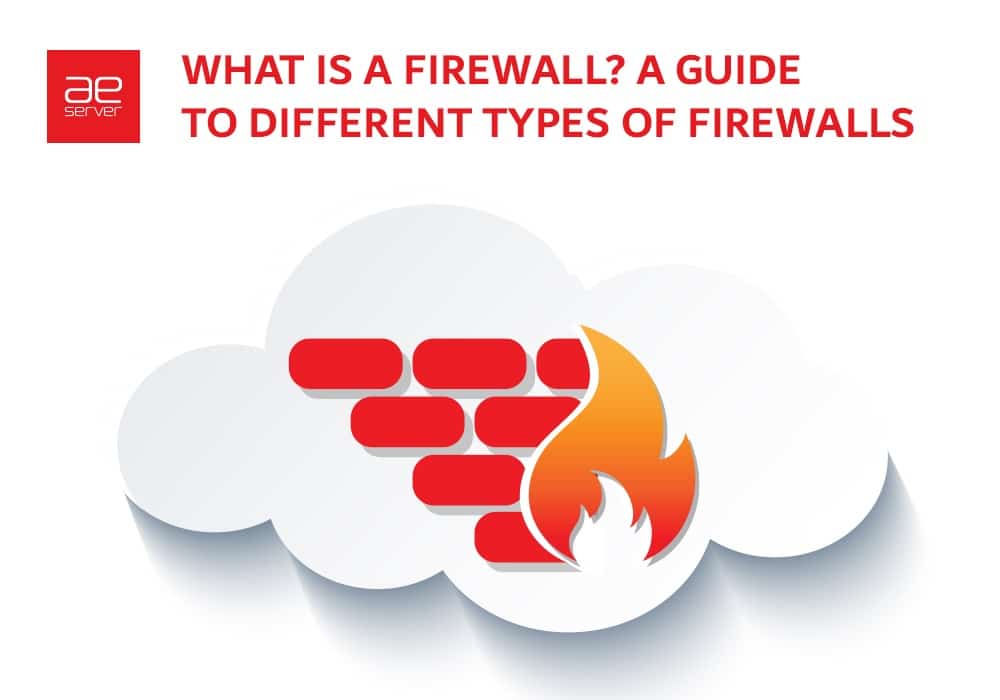
What Is a Firewall? A Guide to Different Types of Firewalls
With the increasing number of cybercrimes, protecting your data is necessary more than ever. However, there are many challenges to implementing security. A firewall is one of the security devices that help you safeguard your network and device from unauthorized users.
In this post on “what is a firewall,” you will learn about firewalls, their types, and how it protects your network against vulnerabilities.
Now let’s start by understanding what is a firewall and how it works.
What Is a Firewall, and How Does It Work?
A firewall is a necessary network security tool that monitors and filters ongoing traffic between a network and outside actors. It filters the traffic to approve and block different network nodes based on predefined policies set by the admin. Network nodes are points of connection between networks.
A physical/hardware firewall works like a physical metal detector. It inspects each data packet from outside and determines if it should enter or not based on predefined rules. Once a data packet is inside your network, a software firewall further filters the traffic to approve or block access to specific ports and applications on a network system, providing better security from inside threats.
An access control list may contain specific IP addresses that cannot be trusted. The firewall will not allow any data packets to come from those IPs. Alternatively, the list may define trusted IPs, and the firewall will only allow the data from those listed IPs.
There are different techniques to set up a firewall. The security scope also depends on the type of firewall and its configuration.
Related: Does My Website Need SSL? Know Why It Really Matters!
Key Uses of Firewall
The key uses of firewalls include:
- Firewalls can be used in consumer settings and corporate settings.
- Firewalls can comprise a security information and event management strategy for cybersecurity devices and are installed in the organization’s network to safeguard against external and internal threats.
- We can set the restrictions using firewalls in in-home devices.
- Firewalls can be used for a home network, DSL, or cable modem with static IP addresses.
- Firewalls can perform audit and logging functions by identifying patterns and improving rules, updating them to defend the sudden threats.
- It can be used for antivirus applications.
- When vendors discover new threats, the firewalls update the rule sets to resolve the issues.
Related: How Does SSH Work: Everything You Need to Know
Firewall Delivery Methods
Firewalls can be deployed in three types based on delivery: hardware-based, software-based, and cloud-based. Let’s see what each of these methods offers.
Hardware Firewall
A hardware firewall is a device that acts as a secure gateway between nodes inside the network perimeter. As self-contained devices, they don’t consume processing power or other computing resources from the host device.
Hardware firewalls are suitable for large organizations having many devices on the same network. While they block malicious traffic before reaching the endpoints, they can’t protect devices from insider threats. Therefore a combination of hardware and software firewalls can provide ideal protection to your organization’s network.
Software Firewall
Software firewalls are installed directly on individual devices. They are easier to modify to allow access to one application while blocking others. As software firewalls consume some of the resources like the CPU and RAM of the host device, they can be expensive.
Security admins must configure and manage each firewall separately. Additionally, all devices within a network may not be compatible with a single firewall, and each device will require a different firewall.
Related: Cloud Security Risks & Threats in 2023, and How to Avoid Them
Cloud Firewall
Service providers offer cloud-based firewalls. This service can monitor both internal activity and external on-demand environments. It is also known as a firewall as a service. It can be entirely managed by a managed security service provider (MSSP), making it a good option for large enterprises with security gaps. It can also be beneficial for small organizations with limited devices.
Four Basic Types of Firewalls
There are various types of firewalls based on their traffic filtering methods and functionality. A few of them are:
Packet Filtering Firewall
A packet filtering firewall is the oldest and basic type of firewall that controls data flow to and from a network. It analyses and compares each packet to allow or block them to a set of established criteria.
Related: SSL vs TLS: The Key Differences
Circuit-Level Gateway
A circuit-level gateway is a firewall that establishes Transmission Control Protocol (TCP) connections and active sessions. They work on a higher level of OSI model, checking these connections that rely on predefined rules set by the network administrator, similar to the packet filtering firewall. Circuit-level gateways don’t examine the contents of the data packet related to the TCP, so it can be an incomplete security measure against modern types of malware that has a legitimate TCP handshake. Another firewall should be configured on top of the circuit-level gateway for additional protection. However, it is a simple firewall that can be effective while taking up little time and resources to execute.
Application-Level Gateway (AKA Proxy Firewall)
Application-level gateway or proxy firewalls are implemented at the application layer. It uses a proxy device to verify requests from external clients by inspecting the contents of data packets against predefined rules set by a network admin. Based on the rules, the firewall then allows or denies access to the network. These firewalls also hide internal users’ identities and IP addresses when accessing external web pages. The process can be time-consuming, but it can protect sensitive information by preventing direct contact between internal servers and external clients.
Stateful Inspection Firewall
Stateful inspection firewalls not only examine each packet but also keep track of established TCP connections and whether they are part of the packet or not. They create a table record with the source port, destination port, source IP, and destination IP. They make their own rules dynamically to filter data packets more accurately instead of relying on a hardcoded set of rules. They drop data packets that do not belong to a verified active connection.
Related: Dedicated IP Address vs Shared IP Address: Which Should You Choose?
Other Types of Firewalls
Besides the basic types of firewalls, there are various firewalls. Two most of the famous are:
Web Application Firewall
Unlike traditional firewalls that monitor computer programs, a Web Application Firewall (WAF) monitors and filters web applications. It typically protects a web application from cyber attacks like SQL injection, cross-site scripting (XSS), file inclusion, cross-site forgery, etc. WAF is established on layer 7 of the OSI model and is not designed to defend against all types of cyber attacks. It is usually a part of a suite of tools that together create a comprehensive defence against a range of attack vectors.
By utilizing a WAF, a shield is placed between the internet and the web application. While a proxy server protects the user’s device identity, a WAF protects the server from exposure by having users pass through the WAF before reaching the server.
Related: How to Use CDN to Improve Website Performance – AEserver Guide
Next-Generation Firewall
A next-generation firewall is one of the recent inventions in security technology. These firewalls are like all of the above combined into one. It is designed for deep packet filtering, intrusion prevention, and application-level inspection and information from outside the firewall to go beyond protocol inspection and block.
Next-generation cloud firewalls exist as a service online, but WAFs are more common and provide similar functionality. But if you want the most advanced firewall technology with a full suite of security protection in one program, go for an NGFW.
Related: Why Your Small Business Needs a Firewall
Protect Yourself & Get a Firewall!
As the cyber security field continues to evolve and attacks become more sophisticated, Firewalls will continue to be an essential tool for any individual and organization’s security solution, whether you are in a network, data center, or cloud.
In essence, If you’re looking for a web host with reliable security infrastructure that can support a site of any size, consider AEserver. With our managed WordPress hosting, you will get WAF to guarantee security; you know that you won’t fall victim to hacking. And on the rare chance they break, our rapid team on standby will take steps to get rid of the malware immediately.



